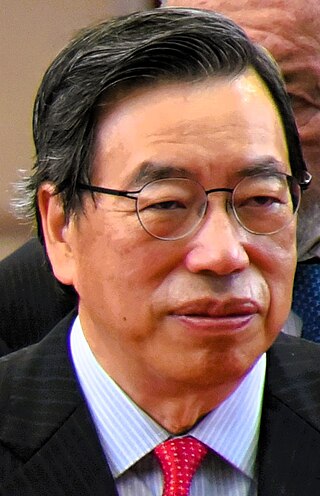Related Research Articles

The Legislative Council of the Hong Kong Special Administrative Region (LegCo) is the unicameral legislature of Hong Kong. It sits under China's "one country, two systems" constitutional arrangement, and is the power centre of Hong Kong's hybrid representative democracy, though popular representation in the legislature has diminished significantly in recent years, along with its political diversity.

The Executive Council of Hong Kong (ExCo) is the cabinet of the Government of Hong Kong, acting as a formal body of advisers to the Chief Executive of Hong Kong that serves as a core policy-making organ assisting the Chief Executive. It is analogous to other Executive Councils in the Commonwealth such as the Federal Executive Council of Australia, the Executive Council of New Zealand, and the Privy Council of the United Kingdom.

The district councils, formerly district boards until 1999, are the local councils for the 18 districts of Hong Kong.

Lydia Selina Dunn, Baroness Dunn, is a Hong Kong-born retired British businesswoman and politician. She became the second person of Hong Kong origin and the first female ethnic Chinese Hongkonger to be elevated to the peerage as a life peeress with the title and style of Baroness in 1990.

Elections in Hong Kong take place when certain political offices in the government need to be filled. Hong Kong has a multi-party system, with numerous parties in the Legislative Council. The Chief Executive of Hong Kong is nonpartisan but has to work with several parties to form a coalition government.

Legislative elections are held in Hong Kong every four years Legislative Council (LegCo) in accordance with Article 69 of the Basic Law. Legislative elections are held either at the expiry of a four-year term or when the Chief Executive dissolves the legislature and calls a new election.

The president of the Legislative Council is the presiding officer of the Legislative Council of Hong Kong. According to the Article 71 of the Hong Kong Basic Law, the president of the Legislative Council is elected by and from among Legislative Council members, plays the presiding role, administrative role and ceremonial role, and ensures the smooth conduct of the Legislative Council meetings.

James To Kun-sun is a Hong Kong lawyer and Democratic Party politician. From 1991 to 2020, To was a member of the Legislative Council of Hong Kong, representing the District Council (Second) constituency. In his final four years, To was the most senior member in the Legislative Council, and was also the convenor of the pro-democracy caucus from 2016 to 2017. He was also a former member of the Yau Tsim Mong District Council representing Olympic.
Unofficial Member is the name given to individuals who are members of the Executive Council of Hong Kong and Legislative Council of Hong Kong but who are not members of the Hong Kong Government. The terms "unofficial" and "official" refer to whether the individual holds governmental office; both categories hold full membership of the councils.
The Senior Unofficial Member, later Senior Member and, finally, Convenor of the Non-official Members, was the highest-ranking unofficial member of the Legislative Council (LegCo) and Executive Council (ExCo) of British Hong Kong, which was tasked with representing the opinions of all unofficial members of the council to the Governor.
The 1985 Hong Kong Legislative Council election was an indirect election for members of the Legislative Council of Hong Kong (LegCo) held on 26 September 1985. It was the first ever election of the Legislative Council in Hong Kong which marked the beginning of the Hong Kong representative democracy.

A plebiscite on whether the Sanitary Board should have an official or unofficial majority was held in Hong Kong in June 1896. It was the only plebiscite conducted by the Hong Kong Government on record. The other de facto referendum launched by the pro-democracy camp through the by-election in 2010 was not officially recognised.
The Constitutional Reform Association of Hong Kong was a political group formed by expatriate British community striving for constitutional reform in Hong Kong in the late 1910s.
Ngai Shiu-kit, OBE, SBS, JP was a Hong Kong entrepreneur and a former member of the Legislative Council of Hong Kong (1985–97) for the Industrial (Second) constituency, representing the Chinese Manufacturers' Association of Hong Kong and Provisional Legislative Council. He was also a Hong Kong delegate for the 9th National People's Congress from 1998 to 2003.
The 1985 Hong Kong electoral reform introduced the first ever indirect election to the colonial legislature during the last years of the British colonial rule in Hong Kong. The reform proposals was first carried out in the Green Paper: the Further Development of Representative Government in Hong Kong in July 1984 right before the Sino-British Joint Declaration in December. The reform laid the foundation of the representative democracy in Hong Kong which developed throughout the last years of the colonial rule and succeeded by the democratic development in Hong Kong after the handover of Hong Kong in 1997.

Sir Sik-nin Chau was a prominent Hong Kong doctor, politician and businessman during the first decades after the Second World War. He was the Senior Unofficial Member of the Executive and Legislative Councils of Hong Kong from 1959 to 1962 and from 1953 to 1959 respectively.